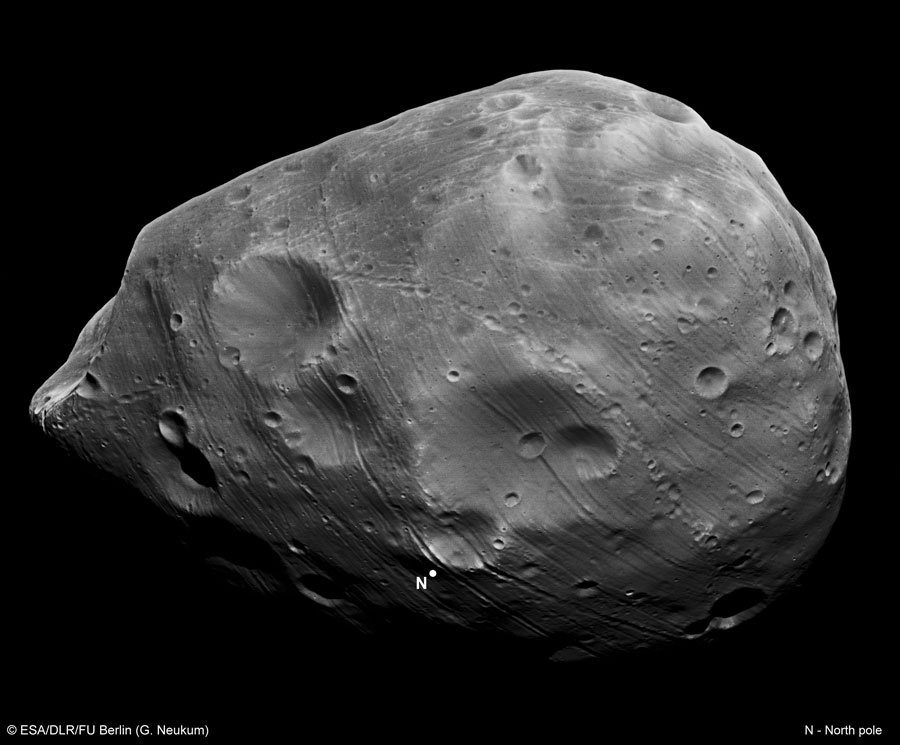
Phobos from Mars Express
Credit: G. Neukum (FU Berlin) et al., Mars Express, DLR, ESA
Posted on 03/17/2010 11:33:08 AM PDT by sig226

Explanation: Why is this small object orbiting Mars? The origin of Phobos, the larger of the two moons orbiting Mars, remains unknown. Phobos and Deimos appear very similar to C-type asteroids, yet gravitationally capturing such asteroids, circularizing their orbits, and dragging them into Mars' equatorial plane seems unlikely. Pictured above is Phobos as it appeared during last week's flyby of ESA's Mars Express, a robotic spacecraft that began orbiting Mars in 2003. Visible in great detail is Phobos' irregular shape, strangely dark terrain, numerous unusual grooves, and a spectacular chain of craters crossing the image center. Phobos spans only about 25 kilometers in length and does not have enough gravity to compress it into a ball. Phobos orbits so close to Mars that sometime in the next 20 million years, tidal deceleration will break up the rubble moon into a ring whose pieces will slowly spiral down and crash onto the red planet. The Russian mission Phobos-Grunt is scheduled to launch and land on Phobos next year.

It’s... full of stars...
Our moon is MUCH prettier! LOL!
Is it a physics thing? or a god thing?
Interesting “path” or linearly arranged pock marks trailing rightward from that one crater on the upperleft of the asteroid which proceeds a curving diagonal path to the lower right of the moon in that snapped image. Almost looks like a mining road or series of areas of scooped up surface.
Depending on the composition of the object, once you have enough mass (and hence gravitational attraction) to deform the material and cause it to flow it will form a sphere. This is because a sphere is the lowest energy configuration – everything on the surface of a sphere is at the same gravitational potential, so there’s no tendency for it to fall to another position.
True spheres are almost never found. Conservation of angular momentum during accretion causes objects to rotate. This rotation naturally causes object to bulge around their equator and flatten at the poles.
Hope this helps.
Garde la Foi, mes amis! Nous nous sommes les sauveurs de la République! Maintenant et Toujours!
(Keep the Faith, my friends! We are the saviors of the Republic! Now and Forever!)
LonePalm, le Républicain du verre cassé (The Broken Glass Republican)
Yes.
Garde la Foi, mes amis! Nous nous sommes les sauveurs de la République! Maintenant et Toujours!
(Keep the Faith, my friends! We are the saviors of the Republic! Now and Forever!)
LonePalm, le Républicain du verre cassé (The Broken Glass Republican)
The material needs to be maleable, so that gravitational effects can work. The moon is thought to be the debris from a large collision with the Earth. Such a collision would generate tremendous amounts of heat, which would soften the solid matter. As a result both the Moon and the Earth compressed themselves into spheres before they soldified. As LonePalm noted, each point on the surface of a sphere is equidistant from the center
After watching a show on the Science channel, showing all the planets in our solar system being in a linear orbit at different distances from the sun, I was wondering if we are unique or are all planetary systems like ours?
I hope that is the right term, linear orbit?
I think it’s because the solar system formed from the accretion disk around the sun, which organized itself into a mostly flat disk before the planets formed. It seems to be the accepted model for planetary systems.
Interesting question. It is my belief that God sets up the rules (gravity), and sometimes we get to understand at least part of them (Newton, Einstein)...
Fill the sink at home, and mix in some bubble bath. Not too much, you want some surface where there are no bubbles. Now, take your finger and poke it into an empty spot. Watch the bubbles gather around your finger. They don’t collect in a straight line, do they?
That’s because of the surface tension of the water. One useful visualization of gravity is looking at space like the surface of your water, and gravity would be the surface tension. The area around your finger has a “gravity” about it, and draws things from all directions.
Every thing in space has a mass, and a slight gravitational “pull” (some now say it’s a “push”) on everything else. The more mass, the bigger the pull. Those bubbles collect together and around your finger as close as they can because they are all fighting to be close to the others, and to your finger. This forms a natural optimization.
Take a look at the bubbles that are sort of little islands out in the middle of the empty spots, if there are any. They will be pretty much in circular patterns, if they are close to the same size. The bubbles are circular, too, all by themselves, aren’t they? The forces doing this are going pretty much equally in every direction, and that’s what causes circular, or spherical shapes.
So, yes, gravity can make things round. As the article says, if there is enough mass to create enough gravity.
(For all you hard-core physicists out there, I know this is not a perfect explanation, so please, don’t get picky on me. I’m “just” an Engineer trying to make the complex understandable for a fellow FReeper.)
By the way, posts 9 and 11 are telling you the same thing as post 14, only in a more precise, technical way...
Disclaimer: Opinions posted on Free Republic are those of the individual posters and do not necessarily represent the opinion of Free Republic or its management. All materials posted herein are protected by copyright law and the exemption for fair use of copyrighted works.